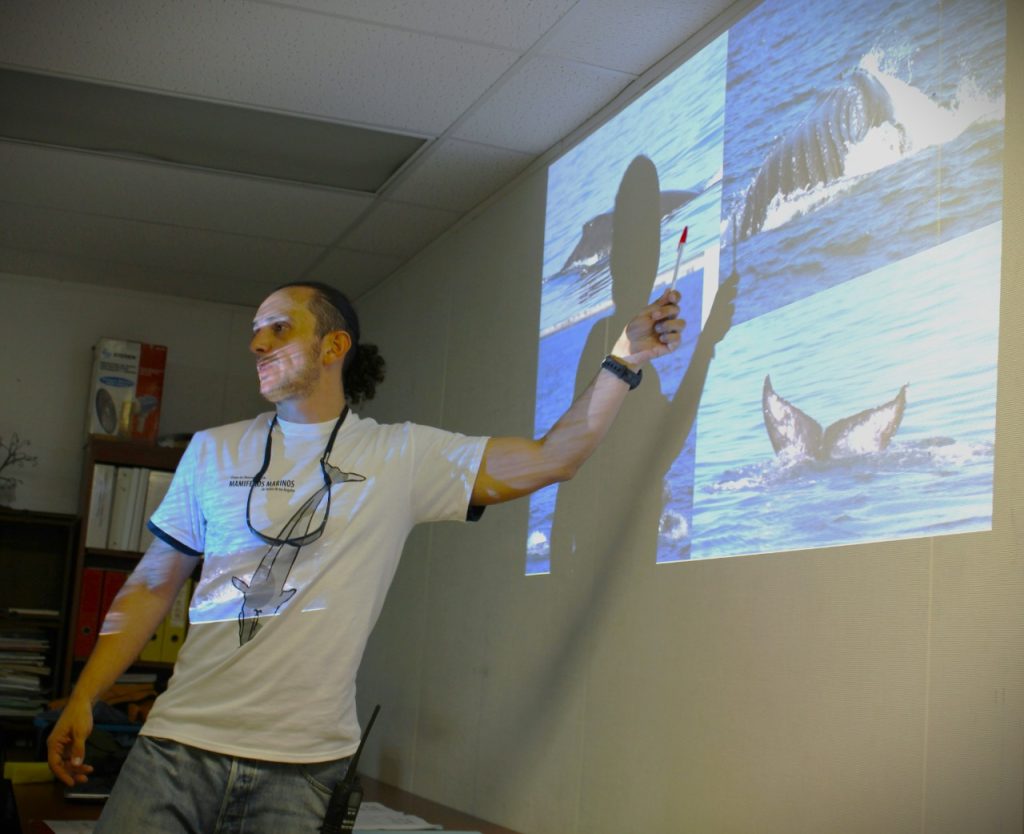Investigador Cátedra CONACYT – Sistema Nacional de Investigadores: Nivel I
_____________________________________________________________________________________________________________________________________________________________
Ecólogo marino interesado en proporcionar bases robustas para la conservación de la megafauna marina mediante el estudio de sus respuestas a diversas escalas de forzamientos ambientales y ecológicos, en términos de la distribución de las especies, su abundancia, dinámica poblacional y comportamiento. En nuestro laboratorio, los análisis de dichos procesos involucran la inferencia de parámetros en escenarios ecológicos explícitos, representados principalmente como modelos jerárquicos bayesianos.

Contacto: mpardo@cicese.mx / CICESE / ResearchGate / Publons / GoogleScholar
_____________________________________________________________________________________________________________________________________________________________
Artículos publicados
15. Juárez-Ruiz, A., M.A. Pardo*, J.C. Hernández-Montoya, F.R. Elorriaga-Verplancken, M.A. Milanés-Salinas, T. Norris, E. Beier, G. Heckel (2022) Guadalupe fur seal pup production predicted from annual variations of sea surface temperature in the southern California Current Ecosystem. ICES Journal of Marine Science (Oxford Academic). 79(5): 1637-1648. DOI: 10.1093/icesjms/fsac097. Factor de Impacto: 3.593.
14. Garcia-Aguilar, María C., M.A. Pardo, A. Fajardo-Yamamoto, R. Ramírez-León, O. Sosa-Nishizaki (2021) First insights on the movement patterns and social structure of short-finned pilot whales in the Gulf of Mexico. Marine Ecology (Springer). DOI: 10.1111/maec.12656. Factor de Impacto: 1.359.
13. Busquets-Vass G., S.D. Newsome, M.A. Pardo, J. Calambokidis, S. Aguíñiga-García, D. Páez-Rosas, J. Gómez-Gutiérrez, L.M. Enríquez, D. Gendron* (2020) Isotope-based inferences of the seasonal foraging and migratory strategies of blue whales in the eastern Pacific Ocean. Marine Environmental Research (Elsevier). DOI: 10.1016/j.marenvres.2020.105201. Factor de Impacto: 2.7.
12. Adame, K., Elorriaga-Verplancken F.R., Beier, E., Acevedo-Whitehouse, K., M.A. Pardo* (2020) The demographic decline of a sea lion population followed multi-decadal sea surface warming. Scientific Reports (Springer Nature): 10 (10499). DOI: 10.1038/s41598-020-67534-0. Factor de Impacto: 4.011.
11. Gálvez, C., M.A. Pardo, F. Elorriaga-Verplanken* (2020) Impacts of an extreme ocean warming on the early development of a marine top predator: The Guadalupe fur seal. Progress in Oceanography (Elsevier). DOI: 10.1016/j.pocean.2019.102220. Factor de impacto: 3.245.
10. Carone, E., M.A. Pardo, S. Atkinson, K. Mashburn, H. Pérez-Puig, L. Enríquez-Paredes, D. Gendron* (2020) Sex steroid hormones and behavior reveal seasonal reproduction in a resident fin whale population. Conservation Physiology (Oxford Academic). DOI: 10.1093/conphys/coz059. Factor de impacto: 3.46.
9. Lubinsky-Jinich, D. M.A. Pardo, G. Heckel*, Y. Schramm (2019) Temporal variations in terrestrial counts of Pacific harbor seals in the southern California Current System. Marine Mammal Science (Wiley Online Library). DOI: 10.1111/mms.12579. Factor de impacto: 2.0.
8. Adame, K., M.A. Pardo*, C. Salvadeo, E. Beier, F. Elorriaga-Verplancken (2017) Detectability and categorization of California sea lions using an unmanned aerial vehicle. Marine Mammal Science 33(3): 913- 925 (Wiley Online Library). DOI: 10.1111/mms.12403. Factor de impacto: 2.0.
7. Arias-del-Razo, A., G. Heckel*, Y. Schramm, M.A. Pardo (2016) Terrestrial habitat preferences and segregation of four pinniped species on the islands off the western coast of the Baja California Peninsula, Mexico. Marine Mammal Science (Wiley Online Library). Factor de impacto: 1.936. DOI: 10.111/mms.12339. Factor de impacto: 2.0.
6. Pardo, M.A.*, T. Gerrodette, E. Beier, D. Gendron, K.A. Forney, S.J. Chivers, J. Barlow & D.M. Palacios (2015) Inferring cetacean population densities from the absolute dynamic topography of the ocean in a hierarchical Bayesian framework. PLoS ONE (Public Library of Science) 10(3): e0120727. DOI: 10.1371/journal.pone.0120727. Factor de impacto: 3.234.
5. Pardo, M.A.*, N. Silverberg, D. Gendron, E. Beier & D.M. Palacios (2013) The role of environmental seasonality in the turnover of a cetacean community in the southwestern Gulf of California. Marine Ecology Progress Series (Inter-Research). 487: 245-260. Factor de impacto: 2.619. DOI: 10.3354/meps10217.
4. Jiménez-Pinedo, C.*, C. Domínguez-García, M.A. Pardo, F. Trujillo, J.M. Ávila & D.M. Palacios (2011) Cetacean occurrence in the Tayrona National Park, a marine protected area in the Colombian Caribbean. Latin American Journal of Aquatic Mammals 9(2): 154 -159. DOI: 10.5597/lajam00181.
3. Pardo, M.A.*, A. Mejía-Fajardo, S. Beltrán-Pedreros, F. Trujillo, I. Kerr y D.M. Palacios (2009) Odontocete sightings collected during offshore cruises in the western and southwestern Caribbean Sea. Latin American Journal of Aquatic Mammals (SOLAMAC) 7(1-2): 57- 62. DOI: 10.5597/lajam00135.
2. Pardo, M.A.*, C. Jiménez-Pinedo y D.M. Palacios (2009) The false killer whale in the southwestern Caribbean: First stranding record in Colombian waters. Latin American Journal of Aquatic Mammals (SOLAMAC) 7(1-2): 63-67. DOI: 10.5597/lajam00136.
1. Pardo, M.A.* y D.M Palacios (2006) Cetacean occurrence in the Santa Marta region, Colombian Caribbean, 2004-2005. Latin American Journal of Aquatic Mammals (SOLAMAC) 5(2): 129 -134. DOI: 10.5597/lajam00105.
_____________________________________________________________________________________________________________________________________________________________
Disciplinas
- Oceanografía
- Bioestadística
- Ecología
- Biología marina
_____________________________________________________________________________________________________________________________________________________________
Habilidades y experiencia
- Ecología marina
- Inferencia bayesiana
- Oceanografía
- Modelado ecológico
- Ecología espacial
- Macroecología
- Programación en RStudio
- Monitoreo ecológico
- Análisis de datos
- Detección remota
- Seguimiento de animales
_____________________________________________________________________________________________________________________________________________________________
Proyectos
5. Ecología de cetáceos del noroeste de México
4. Cetacean Society International (CT, CT, US). (2014 – 2015) The use of a drone to optimize data collection during cetacean studies.
3. American Cetacean Society (San Pedro, US). (2014 – 2015) Using a quadcopter drone for studying marine mammal ecology in the southwestern Gulf of California: Increasing the autonomy.
2. Society for Marine Mammalogy (CA, CA, US). (2009 – 2010) An approach to the understanding of the physical habitat for cetaceans in the Gulf of California: Linking mysticetes distribution with oceanic fronts and gyres.
1. American Cetacean Society (San Pedro, California, US). (2008 – 2009) A cetacean community structure related with changes in the pelagic environment: Cuenca Alfonso, Gulf of California.
_____________________________________________________________________________________________________________________________________________________________